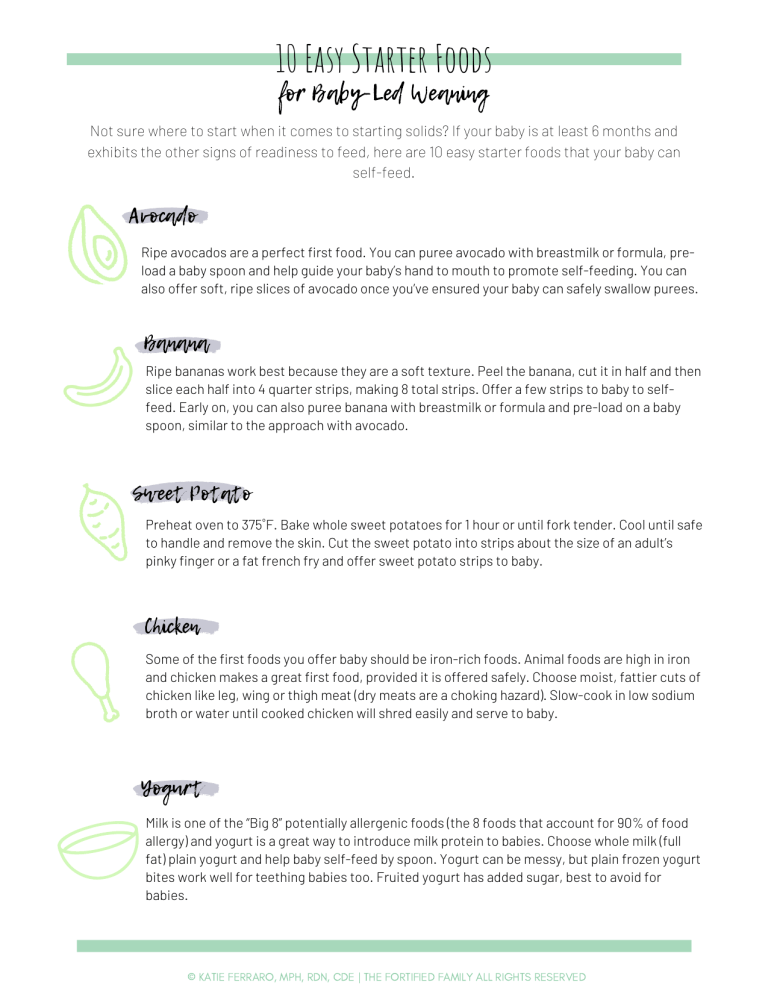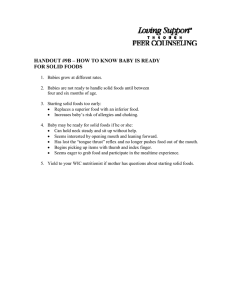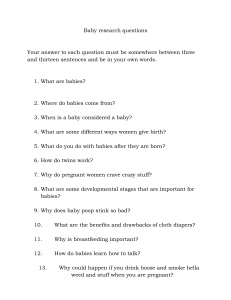
10 Easy Starter Foods for Baby-Led Weaning Not sure where to start when it comes to starting solids? If your baby is at least 6 months and exhibits the other signs of readiness to feed, here are 10 easy starter foods that your baby can self-feed. Avocado Ripe avocados are a perfect first food. You can puree avocado with breastmilk or formula, preload a baby spoon and help guide your baby’s hand to mouth to promote self-feeding. You can also offer soft, ripe slices of avocado once you’ve ensured your baby can safely swallow purees. Banana Ripe bananas work best because they are a soft texture. Peel the banana, cut it in half and then slice each half into 4 quarter strips, making 8 total strips. Offer a few strips to baby to selffeed. Early on, you can also puree banana with breastmilk or formula and pre-load on a baby spoon, similar to the approach with avocado. Sweet Potato Preheat oven to 375˚F. Bake whole sweet potatoes for 1 hour or until fork tender. Cool until safe to handle and remove the skin. Cut the sweet potato into strips about the size of an adult’s pinky finger or a fat french fry and offer sweet potato strips to baby. Chicken Some of the first foods you offer baby should be iron-rich foods. Animal foods are high in iron and chicken makes a great first food, provided it is offered safely. Choose moist, fattier cuts of chicken like leg, wing or thigh meat (dry meats are a choking hazard). Slow-cook in low sodium broth or water until cooked chicken will shred easily and serve to baby. Yogurt Milk is one of the “Big 8” potentially allergenic foods (the 8 foods that account for 90% of food allergy) and yogurt is a great way to introduce milk protein to babies. Choose whole milk (full fat) plain yogurt and help baby self-feed by spoon. Yogurt can be messy, but plain frozen yogurt bites work well for teething babies too. Fruited yogurt has added sugar, best to avoid for babies. © KATIE FERRARO, MPH, RDN, CDE | THE FORTIFIED FAMILY ALL RIGHTS RESERVED 10 Easy Starter Foods for Baby-Led Weaning Cauliflower Roasted cauliflower tastes better than boiled! Wash the cauliflower, cut into florets and toss with your favorite oil. Roast in a 400 degree F oven for 20 minutes or until golden brown. The fat from the oil is important for baby’s brain development and the cauliflower floret stalks make great handles for self-feeding babies. Apple Raw, hard apple slices are a choking hazard for babies (and even bigger kids). You can safely offer cooked soft apple slices or unsweetened applesauce to babies. To make cooked apple slices, peel the apple, core it, cut into 8 slices, cook in a covered saucepan over medium heat with an inch of water until apples are soft. Top with nutmeg or cinnamon for a new flavor. Cooked Whole Grains Whole grains contain iron and carbohydrate, but the small pieces can be hard for babies to pick up before they develop a pincer grasp. Try using cooked whole grains like quinoa, brown rice, millet or bulgur in patties that you then fry as fritters. Mix the cooked whole grain with one egg, add seasoning (avoid salt), fry in oil until crispy, cool and serve to baby. Beef Beef is another great iron-rich food for getting your baby some iron. You can slow cook and serve shredded roasts, or experiment with ground beef too. Serve baby hamburger strips or mini meatloaf that you can make ahead in muffin tins, saving and freezing for leftovers later. Egg Egg is another one of the "Big 8" foods. Egg yolk has iron, fat and other minerals that babies need, but the white is where the potentially allergenic egg protein is. Offer your baby both egg white and yolk together: you can scramble, hard-boil or serve fried egg strips to baby. It’s wise to wait a few days between introducing new allergenic foods, but for all of the lower-risk foods, 1 new food per day is fine. © KATIE FERRARO, MPH, RDN, CDE | THE FORTIFIED FAMILY ALL RIGHTS RESERVED



